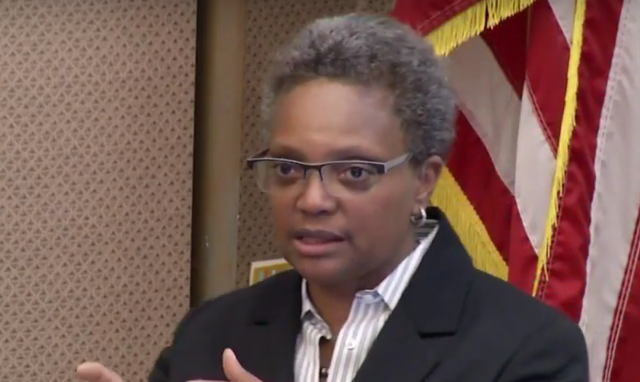 Lori Lightfoot at MacLean Center by MacLean Center is licensed under CC BY 3.0
Lori Lightfoot at MacLean Center by MacLean Center is licensed under CC BY 3.0
Broadening the power of the state to steal private property is now part of Mayor Lori Lightfoot’s unorthodox solution to rising crime in Chicago. Lightfoot has renewed her calls to pass to the Victims Justice Ordinance, which would give the city the authority to file civil lawsuits against suspected gang members and take property thought to be connected to gang activity.
While addressing gang crime is a worthy focus, passing the ordinance would give the city broad authority to seize cars, money, and other private property with no warrant and without ever charging someone with a crime.
Though Lightfoot paints the ordinance as an anti-gang measure, the definition of “streetgang member” is left intentionally vague to cover parents, caretakers, family and friends. All of these innocent parties would be left open to having their property seized by the police for reasons beyond their control. For example, the grandmother of someone associated with an alleged gang member could have her car taken if her grandchild simply had access to the vehicle – and even if it was never directly used in illegal activities.
Contrary to Lightfoot’s claims, defendants in these cases would not have the right to an attorney. Since the suit is filed in civil court, not criminal, the defendants must bear the expense of fighting the city for the return of their property. Moreover, the proposed ordinance shifts the burden to the accused to prove that they are not involved in gang activity. The deck is automatically stacked in favor of the state. These high legal costs and burdens tend to discourage innocent victims from pursuing the return of their stuff – despite having never been charged with a crime.
To her credit, Lightfoot took a decidedly pro-police stance during a recent speech on public safety. She asked for more officers, detectives, prosecutors, and federal marshals to combat rising crime, in a stunning turnaround from her “defund the police” pledge last year to cut $80 million from the Chicago Police Department budget.
Instead of helping to fight crime however, her concurrent proposal to expand civil asset forfeiture seems more like the government taking the opportunity to get in on it. It would do little to reduce gang violence and would unfairly penalize innocent civilians with the arbitrary seizure of their cash and possessions, all without a single criminal charge.
The power of civil asset forfeiture has been abused by many law enforcement agencies for years. In 2014, police departments seized more than $5 billion in property value from American citizens – more than every burglary committed that year.
Some states have exemplary laws restricting the ability of government agents to seize private property without a conviction. The purpose of these laws is not to undermine the government’s ability to seize property from gang members, but to secure adequate legal protection for innocent individuals who are unfairly targeted and harmed by such practices. Sixteen states require a criminal conviction for most property forfeitures, and in four states, civil asset forfeiture is banned outright.
Rather than remove critical legal protections against government theft, Chicago should look to these twenty states as a model for reform and take action to protect its residents from government abuse. The government should stay focused on their responsibility to fight crime.

